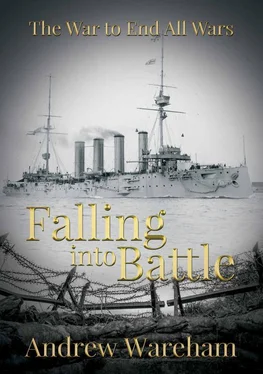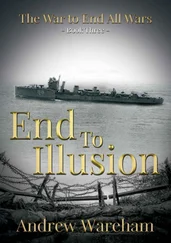“If I spot him, I’ll order him to report, sir.”
“Good man!”
Christopher made a display of running, found a petty officer with a party of four actually doing the job, methodically working from one to the next.
“Well done, PO. Who put you to this job?”
“Nobody, sir, but we wasn’t ordered to nothing else and it needed doing.”
“Even better. What’s your name, PO?”
“Trotter, sir.”
“I won’t forget you. Have you seen the gunroom sub or any of the mids?”
“No, sir.”
“Then well done for your initiative, Trotter. I shall report to the Commander. How many boats left to check?”
“Just two, sir.”
“Good. Finish them and take a smoke break and then report to your watch officer, Trotter.”
“Aye aye, sir.”
Christopher found the Commander, still at the centre of affairs on the upper deck.
“Found a PO Trotter who had almost completed the job. Had a quick look on my way back to you and the boats I saw were all properly secured, sir. He had no orders and nothing else to do, saw the job needed attention.”
“Well done, Adams. Trotter, you say? I don’t know all of my POs yet, but I shall remember him. No sign of sublieutenant or mids, I imagine.”
“Trotter had seen none, sir.”
“The sub was dumped on us at Chatham. I know why now. You are sent as a senior watchkeeper, assistant to the Navigating Officer. You are a specialist navigator, are you?”
“Yes, sir. I was on my way to join a special squadron in the Med, sir. More likely to be busy here, sir.”
“That’s the right attitude, Adams! Nonstop to Port Stanley and then to locate and destroy the Tsingtao Squadron. Don’t come back without doing the job! Admiral Sturdee has been pulled out of the Admiralty and entrusted with the task. No failure can possibly be tolerated – we are to destroy the whole squadron. The ship must be brought to top line before we reach the Falklands. We have a disparate bunch of officers pulled together at random and I shall rely on my more senior men to make us into a team. I don’t know you, obviously, but if you carry on the way you have started then I shall be very pleased. Take yourself to the wardroom now; there should be a late breakfast available. Eat, then make your number with the First Lieutenant and the Navigating Officer. Get some food in you first.”
Christopher saluted, best and crispest style such as an admiral might expect, and went in search of the wardroom, not dissatisfied with his few hours of hard labour. First impressions were what counted, and that meant piling into the work, doing more than was reasonably expected and, above all, never moaning.
He sat to table and attacked a plate of bacon and eggs, the room in near silence as was expected at breakfast. He glanced around him, identifying as many of the officers as was possible from their badges. He noted especially those who ate quickly and paced urgently out of the wardroom, back to work. Those who found a comfortable armchair were also worthy of his notice as people to avoid. He drank his tea and walked out to the wardroom flat, glanced across to a steward.
“Is the First Lieutenant in his office, do you know?”
“Yes, sir.”
The steward pointed.
It was a big ship and there were many offices located in the stern area.
Christopher knocked on the open door.
“Lieutenant Adams, sir. Reporting to join, sir.”
“Good. Come in. The Commander said you had come aboard in the minutes before we sailed. Said you went straight to work. Well done! It’s what we need. I’ll introduce you to the captain when he’s free – which might well not be today! For the while, you are to be number two to the Navigating Officer. We have enough bodies that I do not need to put you on the watch roster – which means you are never off call, twenty-four hours a day.”
“Good experience, sir.”
“So it is. What was your last ship?”
“Iron Duke, sir.”
“Under the eyes of the C-in-C, eh?”
“It’s a good place for promotion, sir, even if not so handsome for action. Don’t want to fall behind, sir. Coming out of a war having stood at an admiral’s shoulder and never smelt powder can’t be good for one’s future. I had just been posted to the Med, sir. Special squadron being formed, mostly pre-dreadnoughts, with the aim of indulging in inshore bombardment work. In the Adriatic against the Austro-Hungarian fleet, it was expected, but a chance of being busy with the Turks when they come in.”
“Might be too busy for me, Adams! Make a change from Scapa Flow, that’s for sure. You will certainly see action here and you can go off to the Med on our return.”
Christopher went off to find the Navigating Officer content that his credentials as a fire eater had been established. All he had to do now was continue to shine and hope that he did not go the way of poor old Hector McDuff, who had been a pleasant chap, a good shipmate as a midshipman.
He needed to pick up a decoration, if at all possible. He suspected that there were other young officers doing better out of the war than him and promotion in peacetime would be much affected by a successful war; a man with a career to make must consider all factors.
The depot at Bedford was busy at eight o’clock in the morning, the parade ground occupied by one battalion of recruits, the drill square by another. Richard paid off his taxi outside the gates, as he knew was proper, and strode across to the guardroom, making an effort to show straight-backed and formal. Officers returning from a weekend away normally made a play of being casual, of tipping their hat to the guard; Richard thought it better not to pretend to be one of the peacetime public school professionals.
The sergeant of the guard had spotted him the moment he had stepped out of the cab. The buzz was that the new VC was a Terrier, an amateur gentleman, one to be treated with circumspection until he made clear just what sort of officer he was. There would be a maximum of formality until he had shown he was anything more than a hero. The four men on the gate were waiting, at attention.
“Captain Baker, D Company, 3 rdBattalion.”
“Sir! Squad! Present arms!”
The sergeant opened the barrier personally, an act of great condescension and respect – sergeants were not in the habit of doing things, they ordered lesser bodies to get their hands dirty.
“Thank you, Sergeant. Can you tell me which is 3 rdBattalion offices?”
“Private O’Grady! Escort Captain Baker to his proper place.”
The private named, an older man, long in the ranks by the look of competence about him, doubled into the gatehouse and set his rifle in the rack, saluted and requested Richard to accompany him. His sleeves bore the faint mark of stripes, sewn on and removed, quite possibly more than once.
‘A fierce man in drink, most likely’, Richard mused.
“Which battalion, soldier?”
“Private O’Grady, 3 rdBattalion, sir. Waiting posting to France, sir.”
“Not assigned to a company yet, O’Grady?”
“Depot, sir. Transferred from 2 ndBattalion, sir.”
Richard suspected that might have been to take him away from a battalion where he was a bad influence, having fought too many, too often. He glanced across, weighing up what he saw. O’Grady had his marksman’s badges but none for good conduct. He was probably thirty years old or a year or two more, perhaps five feet two tall, barely sufficient to scrape into the army, but he was heavily muscled, seeming almost squat. Brown-eyed and curly haired with a well-broken nose but half a grin on his face. It was not impossible that the sergeant had selected him deliberately, to bring him to Richard’s attention.
Читать дальше












